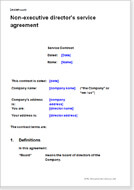Our directors' service contracts are sharp and clear. For the executive director involved in the day to day management of the company, employment terms have been combined with provisions that provide additional protection for the company required for someone at the most senior level of the management structure. Our set also includes more traditional service agreements for self-employed, non-executive directors and for an unpaid 'non-exec', as may be needed by a charity.
Directors service agreement (employment contract)
This directors service agreement is a complete legal and practical framework for the employment of any executive director, whether on a running contract or on a fixed term. It is an employment contract for senior level staff that also defines the relationship between the director and the organisation. Provision for remuneration and common benefits is included, as is strong protection of company information.
Non-executive director's service agreement
This non-executive director's service agreement is a contract for services of a self-employed, part-time director.
It can be used for a fixed term or a running contract for a company director, or director-level equivalent in a charity or other organisation. It provides particularly strong protection of business information.
Unpaid non-executive director's service agreement
This non-executive director's service agreement is a contract for services for an unpaid, part-time director.
It can be used for a fixed term or a running contract for a company director, or director-level equivalent in a charity or other organisation. It provides particularly strong protection of company data.

If the document isn’t right for your circumstances for any reason, just tell us and we’ll refund you in full immediately.

We avoid legal terminology unless necessary. Plain English makes our documents easy to understand, easy to edit and more likely to be accepted.

You don’t need legal knowledge to use our documents. We explain what to edit and how in the guidance notes included at the end of the document.

Email us with questions about editing your document. Use our Lawyer Assist service if you’d like our legal team to check your document will do as you intend.

Our documents comply with the latest relevant law. Our lawyers regularly review how new law affects each document in our library.
An executive director used to have a 'service agreement'. Today a company is legally required to provide written employment contract, just as it is to any other employee, and even if the director is the sole owner of the company.
A non-executive director is not an employee of the organisation but an independent contractor. They therefore require a contract that preserves their self-employed status and clarifies that the work they perform is in the nature of consultancy rather than executive employment.
Accordingly, the greatest differences between our directors’ service contracts relate not to what position the director holds, or the directors' duties, but to their contractual relationship with the business.
All these agreements are therefore suitable:
- for use by any type of organisation: company, charity, trust, partnership, governmental organisation or other
- for use with directors holding any position within the organisation
- when a company engages a director, or for updating an existing director's service agreement
- for permanent and fixed terms of appointment
What these agreements cover
In addition to the terms that regulate employment or self-employment, there are many other matters that should be agreed in a director agreement.
Our documents:
- are up to date with current applicable employment law
- protect the director from unreasonable demands by other directors and shareholders
- set out such services as the director agrees to provide in their role, remuneration and benefits
- cover the director's duties, what happens at termination, and in case of redundancy
- include strong protection for the organisation’s intellectual property
- minimise the administrative burden of legal compliance
Some of the provisions are required to comply with the law. Others are practical. The explanatory notes, which come with these documents, will guide you as to the importance of specific issues.
These contracts provide a balance between protection for the company and for the director. If there is a difference in interests, we favour the company.
All rights reserved



